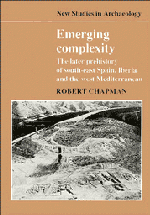Book contents
- Frontmatter
- Contents
- List of figures
- List of tables
- Preface
- 1 Two tribes: questions of theory, scale and explanation
- 2 Hello, goodbye: Iberian prehistory and traditional archaeology
- 3 Another one bites the dust: the implications of the absolute chronology
- 4 Getting better: south-east Spain, the cultural framework 5000–500 bc
- 5 Dancin' in the dark? Adaptation and intensification in south–east Spain
- 6 Centrefield: recent models of intensification and cultural change in south-east Spain
- 7 Into the groove: system scale and technological innovation in south-east Spain
- 8 Out of reach? Complexity, interaction and integration in south-east Spain
- 9 Eliminator: models and the archaeological record in south-east Spain
- 10 Strong persuader: intensification and interaction in Iberia and the west Mediterranean
- 11 With or without you: variability, evaluation and complexity
- Bibliography
- Index
8 - Out of reach? Complexity, interaction and integration in south-east Spain
Published online by Cambridge University Press: 05 March 2012
- Frontmatter
- Contents
- List of figures
- List of tables
- Preface
- 1 Two tribes: questions of theory, scale and explanation
- 2 Hello, goodbye: Iberian prehistory and traditional archaeology
- 3 Another one bites the dust: the implications of the absolute chronology
- 4 Getting better: south-east Spain, the cultural framework 5000–500 bc
- 5 Dancin' in the dark? Adaptation and intensification in south–east Spain
- 6 Centrefield: recent models of intensification and cultural change in south-east Spain
- 7 Into the groove: system scale and technological innovation in south-east Spain
- 8 Out of reach? Complexity, interaction and integration in south-east Spain
- 9 Eliminator: models and the archaeological record in south-east Spain
- 10 Strong persuader: intensification and interaction in Iberia and the west Mediterranean
- 11 With or without you: variability, evaluation and complexity
- Bibliography
- Index
Summary
The bulk of the discussion in this chapter relates to complexity in the later prehistory of south-east Spain, with much less space devoted to interaction and integration. Such an emphasis directly reflects the attention devoted by archaeologists to these three variables in this area, but even in the case of complexity there have been few systematic attempts to collect relevant archaeological data. Indeed the stimulus provided by such attempts illustrates the potential of social archaeology in south-east Spain. Past social organisation is not out of reach of the archaeologist.
Complexity
According to Blanton et al. (1981, p. 21), complexity can be defined by ‘the extent to which there is functional differentiation among societal units’. This differentiation can be either horizontal (‘functional differentiation among parts of equivalent rank in a system’) or vertical (‘rank differences can be seen among functionally diverse parts’). Such functional differentiation may be political or economic, and sometimes both, and what begins as horizontal specialisation may be elevated to vertical specialisation (e.g. where craft specialists are given higher status).
All of the interpretations about the causes and consequences of intensification in south-east Spain adopt positions on the degree of complexity in the Copper and Bronze Ages. All accept the existence of social inequality, and for most this provides the main stimulus for research into this area of prehistoric Europe.
- Type
- Chapter
- Information
- Emerging ComplexityThe Later Prehistory of South-East Spain, Iberia and the West Mediterranean, pp. 169 - 210Publisher: Cambridge University PressPrint publication year: 1990



